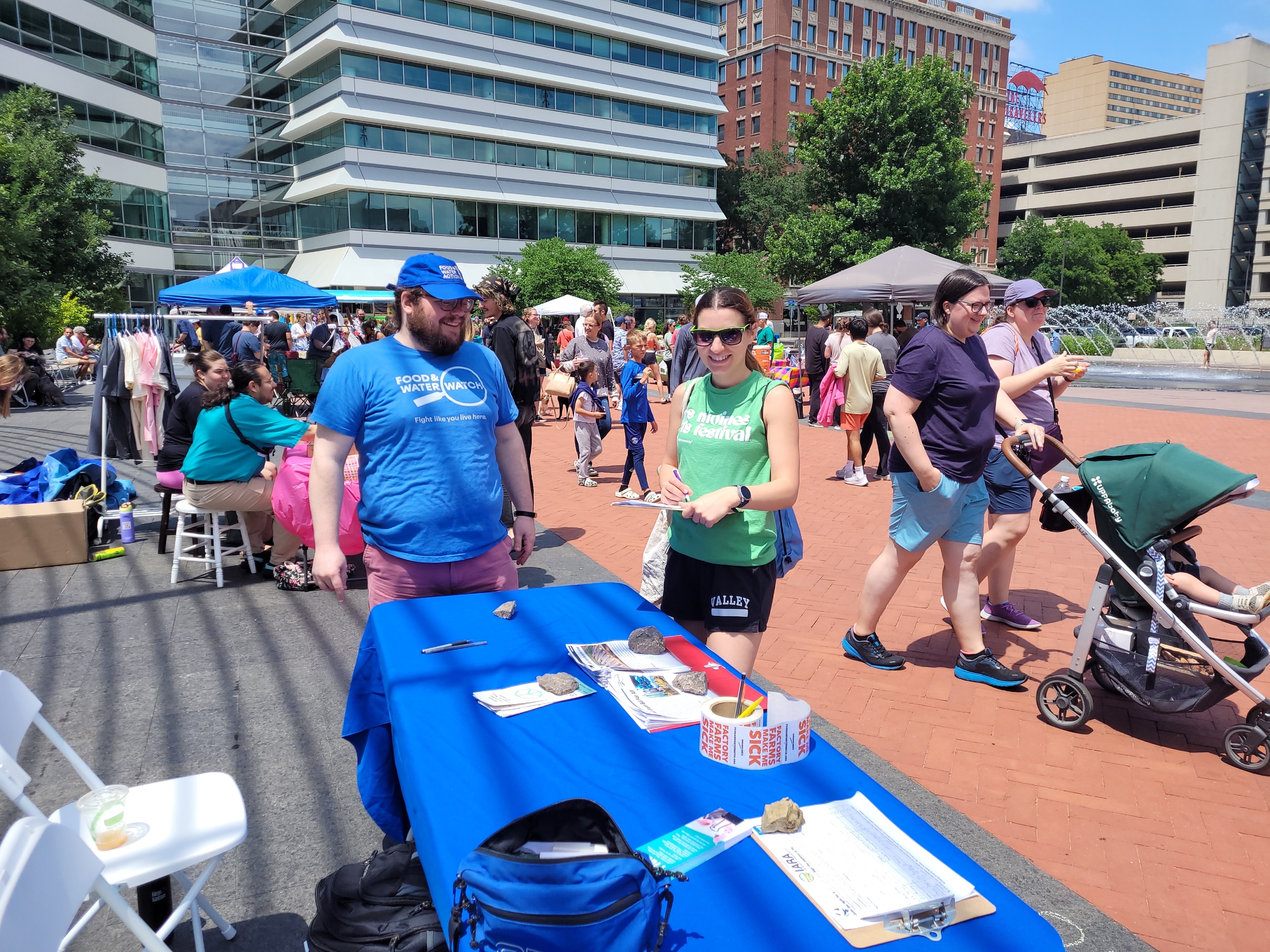How Food & Water Action is Fighting For a Fair Farm Bill For All
Published August 16, 2023

Our Farm Bill Action Team of volunteers are mobilizing their communities to support a Farm Bill that works for us, not Big Ag.
by Mia DiFelice and Katy Kiefer
Update (November 16, 2023): This month, Congress extended the deadline for the 2023 Farm Bill to September 30, 2024 as part of a continuing resolution to push back deadlines on must-pass spending bills. In the next 10 months, Food & Water Action will continue building support for a fair Farm Bill for all.
Decades of bad farm policy have made our food system unsustainable — for farmers, for rural communities, for families across the country, and for the planet. But this year, we have an exciting twice-in-a-decade opportunity to reshape that policy.
The Farm Bill passes through Congress every five years, disbursing billions of dollars for nutrition and agricultural programs. As lawmakers negotiate the 2023 Farm Bill this summer and fall, Food & Water Action is seizing the moment. Our volunteers are working hard around the country to rally support in their communities and help us get the food policy we need.
Why We’re Fighting for a Fair Farm Bill
For decades, Big Ag has hijacked the Farm Bill and federal food policy to benefit corporations over families and farmers.
For example, the Farm Bill has spent billions a year incentivizing harmful agricultural practices instead of supporting small- and medium-sized, sustainable food production. It also provides funds for infrastructure on factory farms that pollute our air and water and threaten our climate.
Previous Farm Bills have helped Big Ag get bigger by encouraging record profits and rampant market concentration. As a result, a few mega-corporations rack in the cash, hollowing out rural economies and forcing small independent farmers to get big or get out.
A Fair Farm Bill Works for Families and Farmers, Not Big Ag
We need a Farm Bill that works for farmers and families; for local rural communities and everyone at the grocery store. Through this legislation, we can help shake loose corporations’ stranglehold on our food system, fostering good livelihoods, lower food prices, and greater access to healthy food.
Moreover, the Farm Bill could be a powerful tool to help protect our climate, environment, and public health. It could pull support for destructive practices and megacorporations, then direct that funding toward actually sustainable agriculture.
If the Farm Bill is to serve us and not Big Ag, here’s what it needs to do:
- Ban factory farms, which wreak havoc on the environment and rural economies;
- End subsidies for factory farm infrastructure, while directing more funds toward sustainable farming practices;
- Create a federal farm safety net that protects small from unpredictable markets;
- Break up mega-corporations and stop consolidation; and
- Create fair and competitive markets where small- and mid-sized farms can thrive.
Bringing the Farm Bill to Our Communities
As lawmakers negotiate on the farm bill, they need to hear from constituents. That’s why this year, Food & Water Action volunteers across the country are bringing the Farm Bill to their communities.
We’re tabling at farmers’ markets and other local events. We’re educating neighbors about the Farm Bill and gathering petition signatures to send to lawmakers. And this fall, we’ll meet with legislators to deliver signatures and speak with them about the farm policy we really need.
Katie Olsson has served as a volunteer leader with Food & Water Action for the past year. This summer, she’s joining our Fair Farm Bill Action Team in Michigan, and she shared a bit about what she’s learned with us.
“I can speak about agriculture and the Farm Bill much more intelligently than I could a few months ago and can confidently share that information with others. It has been fun going to farmers’ markets and collecting signatures, too!”
Katie Olsson, FWA Volunteer Leader
Through her work on the team, Katie has learned about the importance of the Farm Bill and how her own state’s senator helped to pass measures supporting small farmers in the 2018 Farm Bill.
“I have also learned how bad Big Ag is on so many levels and how important small and particularly indigenous farmers are on all those levels,” Katie said. “Small and indigenous farmers care for the earth. Big Ag destroys it!”

A Fair Farm Bill Benefits All of Us
Kathy in Nyack, NY, is a public health nutritionist who has kept her pulse on food policy for years. Since joining the Farm Bill Action Team in June, she’s collected more than 900 petition signatures.
Kathy became interested in food policy thanks to her work and her concerns about the environmental impact of factory farming. But she emphasized that the Farm Bill is important for everyone. It touches so many parts of our food system and, as Kathy said, “We all eat!”
“So food is a good way to reach people,” she went on. “And that’s what we’re trying to do — reach people and educate people about the food they are eating.”
A fair Farm Bill would help us ensure the food we eat is affordable, healthy, and supportive of small farmers and rural economies. And it’s not too late to join our fight for it!
Get involved with our Fair Farm Bill Action Team!

